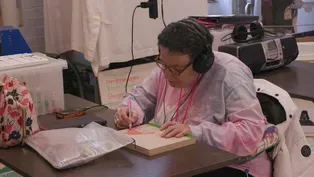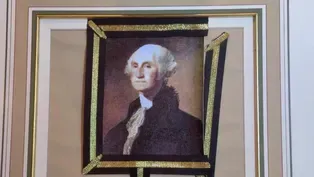
What Trump’s win could mean for veterans and service members
Clip: 11/10/2024 | 6m 27sVideo has Closed Captions
What Trump’s second term could mean for military members and veterans
The full extent of President-elect Donald Trump’s plans for the Pentagon and Department of Veterans Affairs is not entirely clear, but he's likely to reverse some of the Biden administration's policies while reinstating others from his first term. Ali Rogin speaks with Leo Shane III, deputy editor of Military Times, to learn more.
Problems with Closed Captions? Closed Captioning Feedback
Problems with Closed Captions? Closed Captioning Feedback
Major corporate funding for the PBS News Hour is provided by BDO, BNSF, Consumer Cellular, American Cruise Lines, and Raymond James. Funding for the PBS NewsHour Weekend is provided by...

What Trump’s win could mean for veterans and service members
Clip: 11/10/2024 | 6m 27sVideo has Closed Captions
The full extent of President-elect Donald Trump’s plans for the Pentagon and Department of Veterans Affairs is not entirely clear, but he's likely to reverse some of the Biden administration's policies while reinstating others from his first term. Ali Rogin speaks with Leo Shane III, deputy editor of Military Times, to learn more.
Problems with Closed Captions? Closed Captioning Feedback
How to Watch PBS News Hour
PBS News Hour is available to stream on pbs.org and the free PBS App, available on iPhone, Apple TV, Android TV, Android smartphones, Amazon Fire TV, Amazon Fire Tablet, Roku, Samsung Smart TV, and Vizio.
Providing Support for PBS.org
Learn Moreabout PBS online sponsorshipJOHN YANG: On Veterans Day tomorrow, the nation will honor those who've served in America's armed forces.
Tonight, Ali Rogin looks at what a second Trump administration could have in store for them and for current service members.
ALI ROGIN: The full extent of President Elect Trump's plans for the Pentagon and Department of Veterans affairs is not entirely clear, but he's likely to reverse some of the Biden administration's policies while reinstating others from his first term.
Leo Shane III is deputy editor of Military Times and has been covering it all.
Leo, thank you so much for being here.
LEO SHANE III, Military Times: Thank you for the invite.
ALI ROGIN: So remind us, what were President Trump's priorities as it relates to Veterans affairs during his first term?
LEO SHANE III: Yeah, he had two really big ideas that he pushed there.
The first one was the idea of expanding choice, expanding options for veterans and where they could go for medical care.
This is the community care program where veterans can go to private sector doctors and get medical appointments, get things taken care of.
The other one was the idea of accountability.
And this gets into the Trump you're fired speeches there.
He felt that there were too many VA employees who were underperforming, passed some laws that made it easier for them to be fired.
Since then, those laws have been challenged in court, They've been challenged by the unions.
They haven't largely been successful.
When he comes back in, if he's looking at broader federal employee programs of where he can help people or find ways to make them accountable, we may see a resurgence of that again as well.
ALI ROGIN: On the issue of health care, do you anticipate that he's going to work to expand access to those private health care options?
LEO SHANE III: Yeah, I think this is going to be a major thing that comes up again here because we've already seen it from some of the Republicans on Capitol Hill.
There is a real push on this issue of privatization versus choice versus community care.
The folks who support this say this is expanding choice.
This is giving folks more options and it's giving veterans' better healthcare outcome because they can go see whoever they want.
They can see the doctor down the street anytime they want if VA will pay for it.
The critics say this is really outsourcing what VA's responsibility should be.
It's their job to take care of veterans.
It's their job to make sure they're recognizing problems like PTSD, burn pit illnesses.
And those are things that specialized VA doctors are going to do a better job than a community doctor might be able to do.
So they've said that pushing too much of that into the community is really just funneling federal money to private sector doctors.
ALI ROGIN: How widely used is that program now?
And if it does expand, are more veterans likely to take advantage of it?
LEO SHANE III: Yeah, it's a pretty big program right now.
In 2023, it was 40 percent of all VA medical appointments were sent out into the community.
So a lot of veterans are comfortable with this.
And VA has said it is a key point.
You know, Democratic administration said this is a key point we want to keep in terms of making sure that veterans can go to those doctors for routine appointments.
What they don't want is for veterans to get all of their care outside of VA.
They really want to be able to keep tabs on them, not in a Big Brother sort of way, but to be able to say, hey, you know, what kind of problems are you having?
Here's the other resources you have.
A community care doctor might not know about the benefits that you're eligible for.
ALI ROGIN: The issue of veterans' disability ratings.
This is the system by which it's determined how much disability compensation veterans receive.
And the Heritage foundation, the conservative think tank which put out the Project2025 blueprint, which, of course, the Trump campaign distanced itself from, has recommended reassessing those ratings.
What might that look like?
LEO SHANE III: It's hard to say.
This is not a popular idea with a lot of the lawmakers, conservative lawmakers in Capitol Hill.
This is a real third rail in the veterans community, because if you're talking about clawing back any money from disabled veterans, not a very popular position.
But there has been a lot of talk about, has the disability system just become too generous?
Is this a situation where veterans don't really have to show that it's service connected, that they're getting higher disability levels and higher payouts based on injuries that maybe aren't as debilitating as what we've seen in the past?
So there is some chatter about this.
I don't anticipate this really getting too far again, because of the political touchiness of the whole thing.
I think the bigger switch won't be policy.
I think it will be sort of attitude towards that and maybe just not the encouragement that we've seen or even discouragement to veterans to go out and get those disability benefits.
ALI ROGIN: The Trump campaign also talks a lot about issues they characterize as woke military policies, including supporting members of the military who seek abortion, allowing transgender members to serve openly.
How might a Trump Administration 2.0 address some of these issues?
LEO SHANE III: Yeah, I think the abortion issue is going to be a big one for both the DOD and the VA.
They both have fairly generous policies that have come under the Biden administration for the Defense Department.
They allow travel stipends and time off for service members who need to travel across state lines to get abortion services.
For VA, they're actually offering abortions at VA facilities, some in states where it is outlawed, and they have said it's on federal land.
We are not held responsible to state laws.
I can't imagine the Trump administration or anybody that he puts in either of those secretary jobs will support that.
The transgender issue, we will have to see.
Trump, while he was in office the first time, banned the recruiting and the enlisting of transgender individuals into the military.
Didn't kick out folks who were in the ranks already, but would not let new ones join.
Would not be a surprise to see him put that back in place.
Conservatives for a while have complained about VA efforts to move towards providing gender confirmation surgeries, gender reassignment surgeries.
So, I think those folks are going to see, if not a reduction in the services they get, at least not no improvements in the next four years.
ALI ROGIN: The Trump administration, also the first one, prioritized prevention of veteran suicides.
What do you anticipate is going to happen in the second term?
LEO SHANE III: Yeah, and this has been one of the bipartisan issues across administrations.
Everyone has tried to help with this issue of veteran suicide.
We're still losing about 17 veterans a day, according to the latest statistics released by VA.
I think this will still be a top clinical priority for a Trump administration, but I do think that the approach will be different with Democrats.
It's been very focused on programs and approaches that have real empirical evidence behind them really show reductions in suicide or improvements in mental health.
We've heard a lot from conservatives on Capitol Hill that say that they feel like that's overly restrictive and they want to reach out to more faith based groups, more community based groups basically give grants to folks that might not have the scientific proof that they're working, but they feel like they're working.
ALI ROGIN: Leo Shane III, Deputy Editor of the Military Times, thanks so much for coming in and breaking this down for us.
LEO SHANE III: Thank you.
Massachusetts studio celebrates artists with disabilities
Video has Closed Captions
Clip: 11/10/2024 | 5m 13s | Inside a Massachusetts studio showcasing the work of artists with disabilities (5m 13s)
Rare presidential artifacts sell for high prices at auction
Video has Closed Captions
Clip: 11/10/2024 | 2m 19s | Rare presidential artifacts command top dollars on the auction block (2m 19s)
What to know about ‘New Right’ economics advocated by Vance
Video has Closed Captions
Clip: 11/10/2024 | 6m 44s | What to know about the ‘New Right’ school of economic thought advocated by Vance (6m 44s)
Providing Support for PBS.org
Learn Moreabout PBS online sponsorshipSupport for PBS provided by:
Major corporate funding for the PBS News Hour is provided by BDO, BNSF, Consumer Cellular, American Cruise Lines, and Raymond James. Funding for the PBS NewsHour Weekend is provided by...














